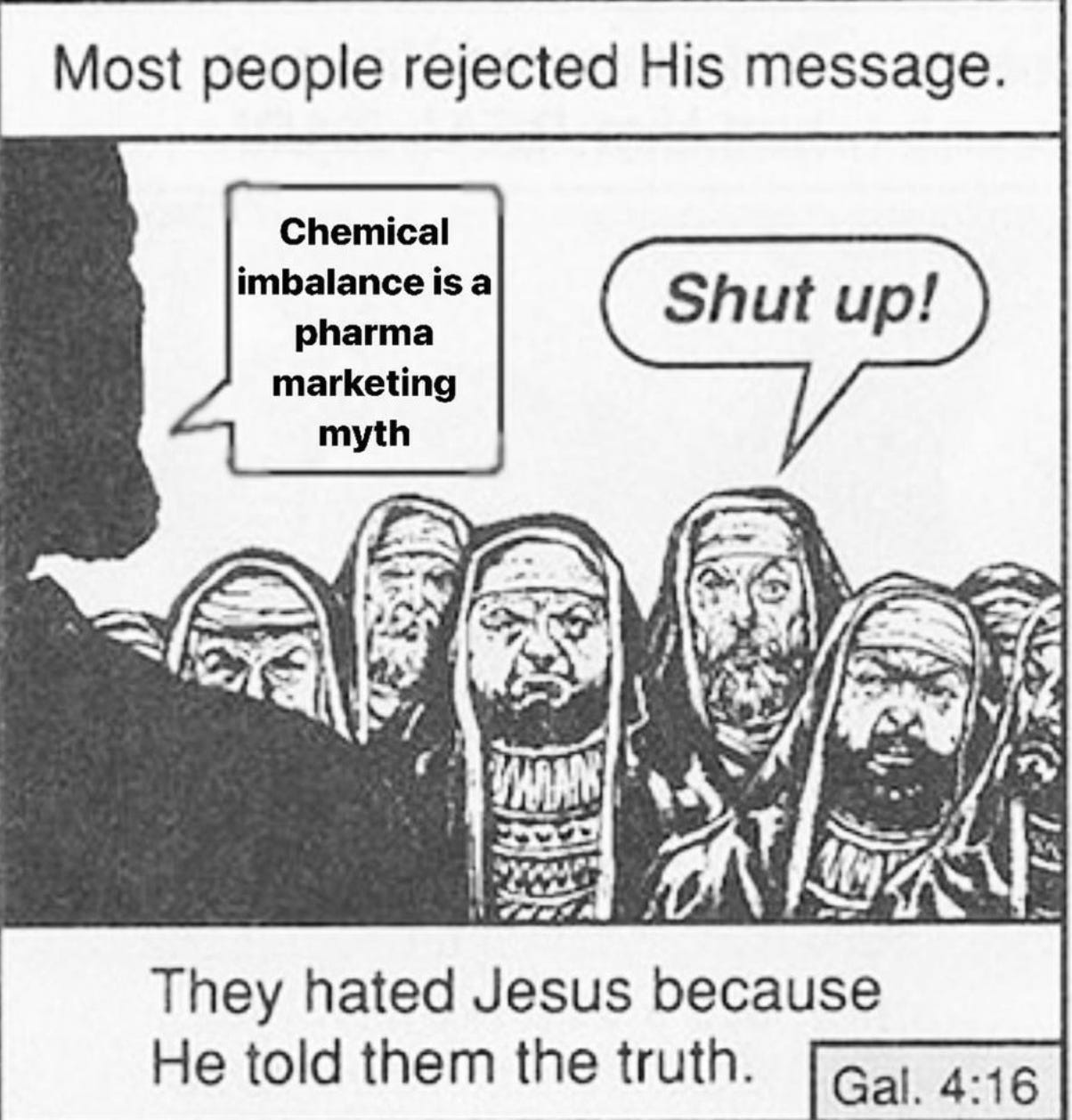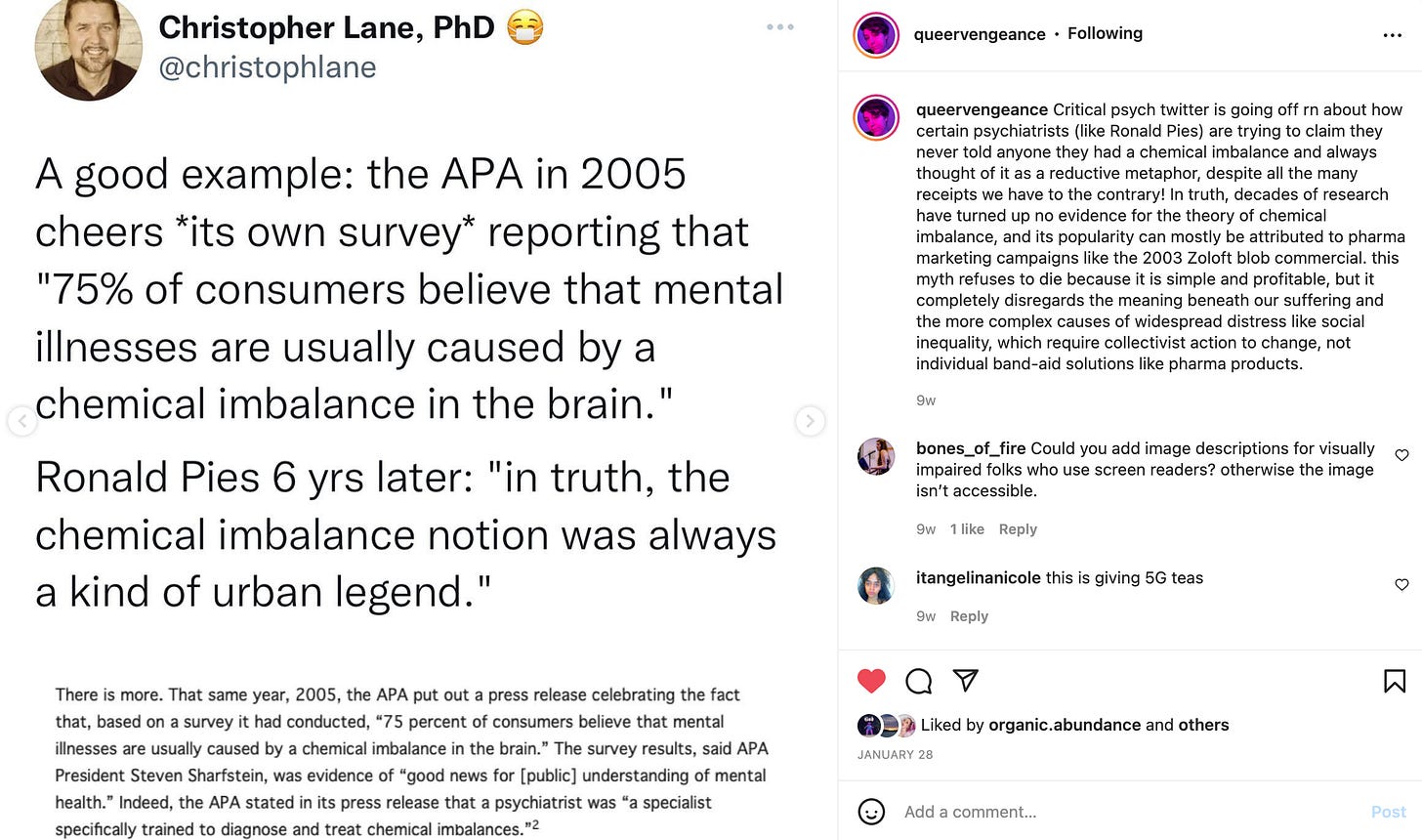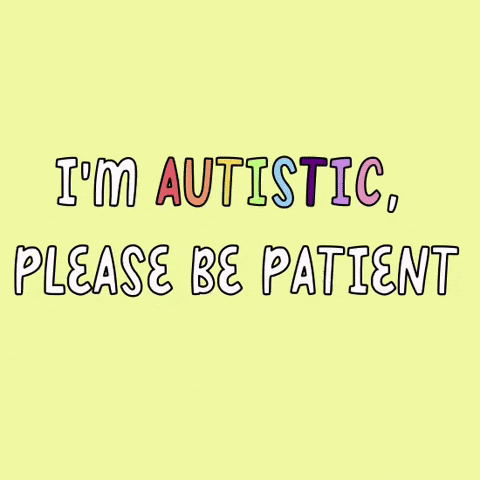Shuffle Synchronicities: Volume 1.5 - #378
Guest Post by Jesse Meadows (Sluggish) + "Your Protector” by Fleet Foxes - 04/21/22
Today we have the very special guest post from Jesse Meadows of the Substack Sluggish!
I learned about Jesse when I followed their meme account, @QueerVengeance, which, for me at least, was one of the first introductions to critical mental health theory on IG. It was through their memes and screenshots that I discovered that an idea that I had come to conclude myself was much more widely known and believed:
As well as:
Jesse also expands on the general chemical balance myth to show how it intersects with capitalism and ‘nonproductivity’.
I then started reading their Substack, Sluggish, which I mentioned in this post, and once again I will say that if you have an interest in critical mental health theory or just ‘embracing the slow, the weird, and the squished underfoot’, I highly recommend subscribing to Jesse’s Substack:
Here’s a more formal bio!
Jesse Meadows is an autistic writer, multimedia artist, and PDF collector whose work focuses on re-politicizing mental health, critiquing the biomedical model of mental distress, and exploring ways to make meaning outside the pathology paradigm (which currently has a lot to do with snails). They have a Bachelor’s in Fine Arts and in former iterations, they’ve worked as a documentary photographer, a local news journalist, and a bartender.
Their current projects include a newsletter for creatives, mind-wanderers, and deviants (Sluggish), a podcast with Dr. Ayesha Khan that takes a critical look at the world of capitalist mental health (Disorderland), and a YouTube channel on art, critical theory, and design with Marta Rose (The Spiral Lab).
Okay, without further adieu, take it away, Jesse!
“Oh Devil” by Electric Guest
This song is emotionally complicated - there’s joy in the beat, but sorrow in the melody, the downturn of the bridge, and these elements combined feel like a sort of resolve. It’s a sad song that makes you want to dance, an audio oxymoron, a symphony of extreme states. I love songs like this, because emotions are never simple for me.
We have been blaming our psychological suffering on devils for centuries. In the era of the DSM, now we have clinical words - depression, panic attack, bipolar disorder. We no longer say that the devil made us do it, or that we’re experiencing irrational fear, panic, because of the Greek god Pan; now we have diagnoses for that.
Growing up in church, I was taught that demons were real. I was terrified they were in my room at night, or latched onto my back. When I was hit with anxiety so bad that I got chronically ill and couldn’t go to school, I was told to pray.
The Church has a track record of glossing over mental distress, or worse, telling Christians that it’s a sin, a sign that you aren’t trusting in God’s divine plan for your life. Psychological suffering is not a disease for Christians, it’s a sign of spiritual weakness, or demonic affliction. When my demons – Fear, and his consequence, Sadness – were finally medicalized, legitimized, I was relieved.
But sometimes we run too far to the other pole in rebellion against the one that hurt us, and we get hurt in opposite ways. The story that Christianity told me about my suffering wasn’t the right one for me, but science stripped my suffering of meaning entirely. Lately I’ve been slipping back toward the center, and finding more solace in spiritual and existential conceptions of distress again.
My Fear is a demon, yes, but it’s one I must befriend. Oh, devil, I'm glad that you came / Guess I should learn how to live because it won't go away. Resisting him results in more pain, more self-destructive desperation, reaching for chemicals and running.
Buddhists tell us that the root of all suffering is desire – so, too, do the psychoanalysts, though their ideas have fallen out of fashion in the age of neuroscience. Both come to a similar conclusion: that the only hope for easing the agony of desire is to face it. We have to understand where it comes from, release what we can, and accept the parts of it that are inevitable.
Psychologists tell us to reframe our demons, but Fear laughs. He mocks my attempts to talk him away. Fear knows I can’t out-think him, can’t out-logic him, because he’s not a cognitive distortion, he’s my shadow.
He’s a feeling, a sensation in the body, and the only thing a feeling demands is to be felt. Feelings don’t care about your facts, your theories, your frameworks of dysfunction. They demand to be experienced, and pushing them away only means they grow stronger out of sight.
I don’t think I’m saying anything here that philosophers haven’t been arguing for thousands of years. There’s no beauty without loss, no pleasure without pain. Suffering is the price of consciousness. The question is not how we get rid of it, but how we care for it.
For most of my life, I denied Fear an audience, so he set up shop in my soft tissues. Devil is back again. When I ignore him, he pours gasoline on my muscles, lights a match. He turns my stomach, and keeps me up at night. When I finally fall asleep, he rampages through my dreams.
I poured whiskey on Fear. I asked my lovers to fight him. I worked myself sick trying to stay too busy for him. I treated him like a disease. None of this kept him away for long.
All that’s left to do now is set a table for Fear; sit across from him and look at his face. I want to pour him tea and say: I understand why you’ve come, and I know you have to live here with me. Oh devil, I know you’re afraid / Sometimes it’s hard to learn from all your mistakes.
I know sometimes you will make me ill, and those are storms we will weather. But I can’t keep waiting for you to move out of my house, so you’re going to have to sit there and watch while I remodel this place, and you have to know that I’m no longer taking your advice. You have to know that I don’t do anything because of you, Fear, but in spite of you.
Wow, thanks so much for sharing this piece with our Shuffle Synchronicities community, Jesse!
So much of this spoke to me since I received your submission on Thursday, April 7th.
I especially appreciated how personal but general the piece was.
I tend to be quite specific here in the memoiristic half of the music & memoir Substack.
But these past two weeks, I’ve had challenging experiences that I’m not quite ready to share here.
Which is weird because that’s what this space has been good for, especially the daily first year.
But what I will say is that I had a wave of that fear and anxiety and anger that your song and your piece are about.
A visit from the Devil you could say.
That put me in a mental/spiritual mindset of hell LOL.
It may have peaked on my birthday, 4/12.
I won’t say too much about it at the moment.
But I will report that the shuffled-to-song was:
“Tequila” by The Champs
Which was one of three songs my ex-wife and I mashed up in our wedding dance.
It started with this Perry Como song:
“Blue Room” by Perry Como
Where we slow-danced.
Then went into this Beyonce song:
“Countdown” by Beyonce
Then The Champs’ Tequila song where we did a Pee-Wee Herman type dance with the movie playing on a big screen behind us.
Before inviting our guests onto the dance floor to finish the rest of the song.
The fact that this song came up on my birthday exacerbated some other issues that I still am not ready to write about.
But Jesse’s analysis of their song was super helpful:
Someone's calling for me, Something's calling for me again
There was something for me to face.
To work on.
And I have.
I’ve been facing it as Jesse wrote.
And working on it.
The devil is back again
So I know I'll never look back again, back again
Because as Jesse writes, in a way, a visit from the Devil is not a bad thing.
Ooh, devil, I'm glad that you came
Guess I should learn how to live because it won't go away
Suffering can lead to growth.
The mental illness itself might be what is within you calling out for help.
Lucifer, Lu-Lucifer, Lu-Lucifer, I need your help
Without bouts of this type of thing, we might not actually do the work to heal or start to heal ourselves.
It reminds me of a Rumi quote I read in Melody Moezzi’s book The Rumi Prescription:
Welcome every guest,
No matter how grotesque.
Be as hospitable to calamity as to ecstasy
To anxiety as to tranquility.
Today’s misery sweeps your home clean,
Making way for tomorrow’s felicity.
The Beloved to be befriended is not just the God half but also the Satanic half of the Divine.
Melody Moezzi sometimes refers to herself as a bipolar writer, which I have done, too.
I’m trying to do it less.
As I reframe my experience with mental illness in terms of The Enneagram or at least in terms of the non-pathological.
Jesse of course helped me with that in their Instagram memes and their Substack.
And so I was a bit surprised when they wrote in their bio that they are an ‘autistic writer’.
I wrote them an email about it which said in part:
…I never edit guest posters' work but I had a question regarding your bio.
I asked my shuffle whether or not to ask you this and I got Fleet Foxes' song "Your Protector"...
“Your Protector” by Fleet Foxes
Not sure if this is a paternalistic "Protector" question/advice or the 'right' kind but...I thought I should go ahead and ask:
What is your thinking behind labeling yourself an "autistic writer"?
I guess I am wondering if you've considered if the autistic label is just as potentially specious as any other psychiatric label...?
I did notice that a line of the post-chorus of the Fleet Foxes' song is: "You run with the devil, You run with the devil" ;)
Lastly, of note, these kinds of extra meta back-and-forths between me and guest posters often go into my half of the collaborations themselves, with your consent of course, as in this example with Kiana Fitzgerald or this one with another guest poster...is that OK with you (potentially publishing your response to this email itself)?
Thanks!
Jesse wrote back in part:
…This is a great question to ask during Autism Month!
Yes, I would agree that all DSM labels are specious (if by specious, you mean “superficially plausible, but actually wrong”) but I would argue that they’re wrong because they’re pathologizing (deeming certain people ‘abnormal’), not because the experiences/traits/behaviors they’re labeling don’t exist.
Psych diagnoses are a certain framing of real distress and real ways of being in the world, but it’s a framing I disagree with, because they draw a line in the sand between what’s “healthy” and what’s not (which is, essentially, a value judgement, not a fact). Many Critical Autism Studies scholars consider the category “autistic” to be a social one, a term that describes people with a certain set of traits and behaviors that are marginalized by society. The academiaspeak for it is an “ontological category” - ontological having to do with being or becoming, so, it’s way of being a person, an identity, not a pathology.
I feel best-defined by the words writer and artist (but you know, we have to put adjectives before nouns, lol). It is a bit of a double-edged sword to be out about being autistic - I’ve heard autistic writers say that they often get pigeonholed into only writing about autism, which is not something I want. But I include it in my bio because I want other autistic and neurodivergent people to be able to find me, and because I spent most of my life trying to hide who I am to the detriment of my health and I just refuse to keep doing that.
Does that answer your question? Or was there something else you were getting at?
It was exactly the answer I was looking for in my question and what I was getting at.
This makes me think now about my own recent work facing Devils.
How I’ve been feeling guilty about not writing about the experience here right away.
Without taking a bit of time to process the experience for myself.
Especially as I’ve seen a number of subscribers re-subscribe for paid memberships and me not having written since April 5th.
My therapist recommended today protecting the process a bit more before doing the work of servicing others by writing about the experience.
Both Jesse and I, like many other writers, want other people going through similar experiences to be able to find us and learn from us.
I admit I felt a surge of reactivity to perceived restrictiveness being told/advised how to process the experiences facing the Devils here.
But upon re-listening to Fleet Foxes song today I heard a lyric in it:
Keep your secrets with you girl
Safe from the outside world
And another one
Would you wait for me?
The other one would wait for me
And I realize that even if I’m not one to keep secrets.
Because I believe vulnerability is necessary for creative service.
Maybe it’s OK to keep secrets for a bit longer, to not always immediately reveal them.
It seems many of you readers will indeed wait a bit more for some of this creative service.
Thank you for that.
And if not, that’s OK, too.
Thanks to Jesse for their wonderful piece reminding me and us all that it’s OK sometimes to say:
“You’re going to have to sit there and watch while I remodel this place.”
Okay, that’s the three hundred seventy-eighth Shuffle Synchronicities.







